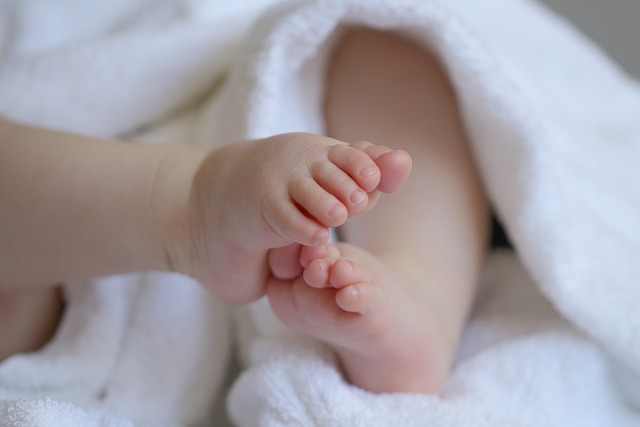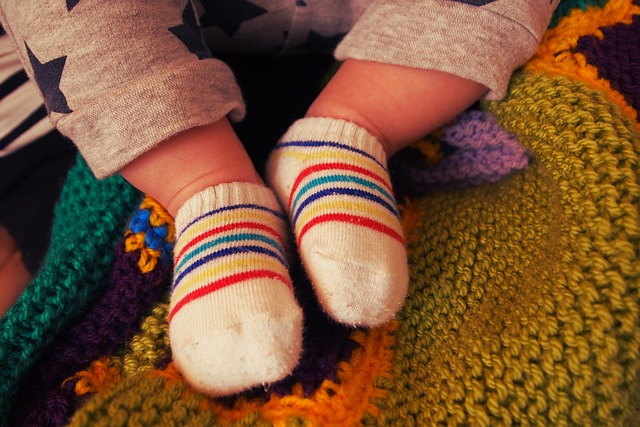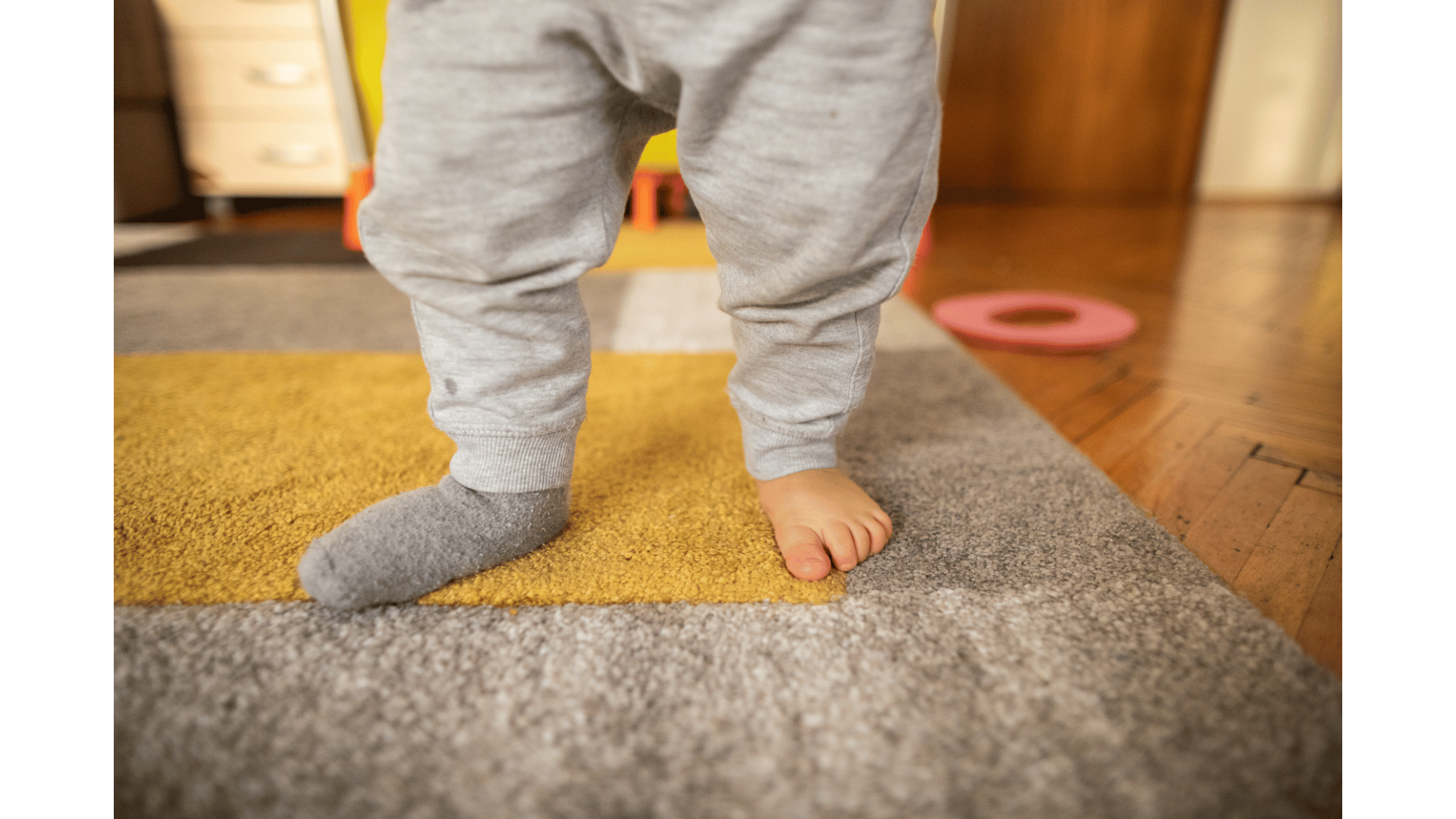Diving into the heart of the "Great Sock Debate": should babies wear socks or go barefoot? It's a hot topic among parents worldwide, splitting opinions down the middle. On one side, the argument for socks is all about keeping those tiny toes warm and cozy, especially during the colder months. On the other, the barefoot camp champions sensory development and the natural growth of a child's feet.
This post aims to explore both perspectives, considering everything from the warmth and protection socks offer against the benefits of letting those little feet breathe and feel the ground. Whether it's a concern for cold feet leading to a sick child, or the belief in promoting healthy foot development by walking barefoot, we're here to provide insights.
Join us as we unravel the pros and cons, equipping you with the knowledge to make the best choice for your baby's feet, whether that means stocking up on cute baby socks or embracing the freedom of bare feet.

Understanding the Baby Socks Debate
Let's dive into the baby socks debate, where the question of sensory development and warmth becomes a balancing act for many parents. You may think that putting socks on your little one is a no-brainer, but it's not as simple as it seems. Sensory development and motor skills are important aspects to consider.
Those cute little baby socks can actually hinder sensory experiences, which are crucial for brain development in infants. Encountering various textures, temperatures, and surfaces provide sensory input that helps your baby explore their environment effectively. Socks can limit this valuable sensory feedback.
Also, motor skill development can be influenced by whether you choose to put socks on your baby. Crawling, standing, and walking can all be affected. The friction between the bare foot and the floor can provide the necessary grip for these movements.
Now, you might be wondering about those often cold hands and feet. But remember, cold extremities in babies don't always mean they're cold overall. So don't rush to put socks on just because their feet feel a bit chilly. Providing sock-free time during the day can be beneficial for your baby's comfort and development.
The Importance of Baby's Foot Temperature
Understanding your baby's foot temperature is crucial, but don't be fooled into thinking cold hands and feet mean they're overall chilly. You see, babies often have poor circulation in their hands and feet, which can make them feel cold to the touch. However, this doesn't necessarily mean your baby is cold. A better indicator of their temperature is the neck or trunk.
When considering socks for your baby, temperature is a key factor. If it's very cold, especially outdoors, suits with feet are recommended to keep your little one warm. But remember, it's not just about the cold. Comfort and safety are also important.

While socks can help keep your baby's feet warm, they shouldn't be the only strategy you use. Instead, focus on adding layers to your baby's body for temperature regulation. It's also essential to provide sock-free time during the day. This allows your baby's feet to breathe and helps them regulate their own temperature.
Perks of Socking Your Baby
There are several benefits to socking your baby, ranging from providing warmth in colder temperatures to preventing slips on smooth surfaces. Socks envelop your baby's tiny feet in comfort and warmth, acting as a shield against the chill in the air. They're not just for cold weather, though. Socks can provide a layer of protection against rough surfaces or sharp objects that might harm those tender feet.
Slipping is a real concern, especially for babies who are just learning to navigate the world on their own. Socks with non-slip bottoms can give your baby the traction they need to explore without fear of slipping. Beyond just protection and warmth, socks can also contribute to your baby's sensory development. Different textures and patterns can stimulate your baby's sense of touch, helping to foster their curiosity about the world around them.
And let's not forget the power of a stylish pair of socks to complete an outfit. With an array of cute and colorful designs available, socks can add a splash of personality to your baby's wardrobe. So, while the decision ultimately rests with you, there's certainly no shortage of perks to socking your baby.
Potential Downsides of Baby Socks
While baby socks offer numerous benefits, they can also act as sensory barriers, potentially hindering your little one's brain development and motor skills. Socks can block the sensory input that bare feet provide, filtering out essential information like texture, temperature, and touch. These experiences are crucial for your baby's sensory development, helping them understand their surroundings and react accordingly.
Furthermore, socks might restrict foot control. They can interfere with the integration of the Plantar Reflex, an essential mechanism for coordinating foot movements. This lack of control can affect your baby's ability to grip the floor, push off, and even develop crawling, standing, and walking skills.
The Barefoot Baby Approach
On the flip side of the sock debate, going barefoot can offer babies unique advantages, particularly when it comes to sensory experiences and motor skill development. The barefoot approach allows your little one to explore their environment in a whole new way. Feeling different textures, temperatures, and even the solidity of the ground beneath their tiny feet can provide sensory experiences that are vital for their brain development.
Barefoot babies often show better foot control. Free from the confines of socks, their feet can move naturally, letting them gain a better grip on surfaces. This freedom of movement enhances the development of their motor skills, leading to improved coordination and balance.
Don't forget the Plantar Reflex, a crucial aspect of motor skill development in babies. When barefoot, they can push off and gain foot control more effectively, enhancing this reflex.
While socks have their place, especially in colder climates, the barefoot approach can offer invaluable benefits to your baby's development. It's a balance, though. Consider your baby's comfort, the temperature, and safety when deciding to sock or not. Ultimately, you know what's best for your child.
Impact on Sensory Perception and Development
Delving into the impact on sensory perception and development, it's key to understand how going sock-free can significantly enhance your baby's interaction with their surroundings. Sensory experiences, such as feeling different textures and temperatures, play a vital role in your child's brain development. Every touch, every step on the grass, the carpet, or the wooden floor, brings in a flood of new sensory information that sparks their curiosity and aids in understanding their environment.
When your baby goes barefoot, they're not just exploring; they're developing critical motor skills. You see, the freedom of movement allows them to grasp with their toes, to balance better, and to gain foot control. These are essential components of motor skill development like crawling, standing, and even walking.
Socks, while they can keep tiny toes warm, might inhibit these sensory experiences and developmental milestones. They can create a barrier between your baby and the world, hindering them from feeling the texture and temperature of what's beneath their feet. So, consider giving a 'sock-free' time during the day to promote sensory input and foster better foot control.
Considering Baby's Comfort and Preference
When it comes to your baby's comfort and preference, you may notice that they seem more content and mobile without socks, allowing them to fully explore and interact with their environment. This sock-free time isn't just about comfort, it's also about enhancing sensory experiences. The world is a tactile playground for your baby, and their feet serve as another way to discover and connect with their surroundings.
Socks can sometimes restrict foot movements, which are essential for motor skill development. The freedom of bare feet can aid in mastering skills like crawling, standing, and walking. It's essential to remember that the development of sensory skills and motor abilities often go hand-in-hand.
However, ensuring your baby's comfort also means keeping them warm. You don't have to rely solely on socks for this. Checking the baby's neck or trunk can provide a more accurate read on their body temperature than their hands or feet. Layering appropriate clothing can provide warmth, allowing you to limit sock use indoors while maintaining a cozy environment. Remember, your baby's comfort and preferences are key in the sock or no sock debate.
Walking Development: Socks or Barefoot?
Let's explore how socks vs. barefoot impacts your baby's walking development. You may be surprised to learn that going barefoot can help strengthen your baby's foot and ankle muscles. This not only promotes proper arch development but also enhances balance skills. It's a simple yet effective way to encourage a natural gait pattern.
Walking barefoot also fosters sensory development. This is due to the ground sensation your baby experiences, aiding in sensory development and proprioception skills, which are crucial for balance enhancement. It's a way for your baby to connect with their surroundings, learning and growing with each step.
Yet, there's also a place for socks in your baby's walking development. Non-slip bottom socks or soft cloth/leather shoes can offer protection while still maintaining sensory input. If you're concerned about safety without compromising development, this can be a good option.
For those leaning towards shoes, consider flat shoes with flexible soles, like Robeez. They support optimal foot development in babies learning to walk. So, whether it's socks or barefoot, what matters most is choosing what's best for your baby's walking development.
Making the Best Decision for Your Baby
Often, making the best decision for your baby involves a careful balance between their comfort and their developmental needs. When considering whether to sock your child's feet, think about both sides of the coin. On one hand, socks can keep your baby's feet warm. However, they might limit valuable sensory experiences that aid in motor skill development.
Bare feet allow your child to engage with their surroundings, fostering proprioception, the sense of self-movement and body position. This free exploration can enhance balance skills and foot strength, crucial for their development. It's also worth noting that a baby's cold hands or feet don't necessarily mean they're chilly overall. Your focus should be on your child's overall body temperature.
In the end, the decision to sock or not is yours to make, based on your baby's needs and comfort. Remember, it's alright to switch things up. You might choose socks for some situations and bare feet for others. The key is to ensure your decision promotes your baby's development while keeping them comfortable and safe.
Conclusion
So, to sock or not to sock? It's not a one-size-fits-all answer.
Consider your baby's comfort, the temperature, and their stage of development.
Whether you opt for socks or barefoot, remember it's all about balance.
Bare feet can aid sensory development, while socks can offer warmth and protection.
Ultimately, you know your baby best. Trust your instincts and make the choice that feels right for your little one.
After all, you're in the driver's seat.
